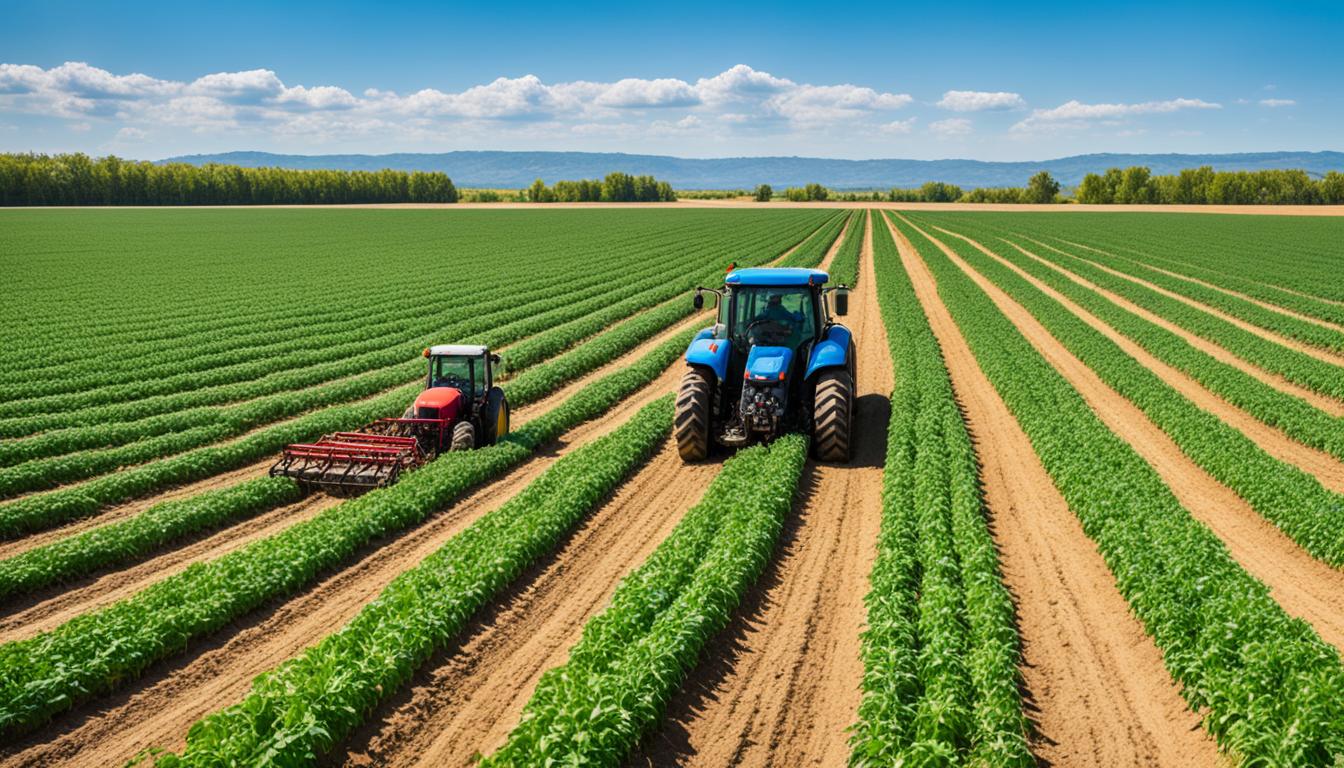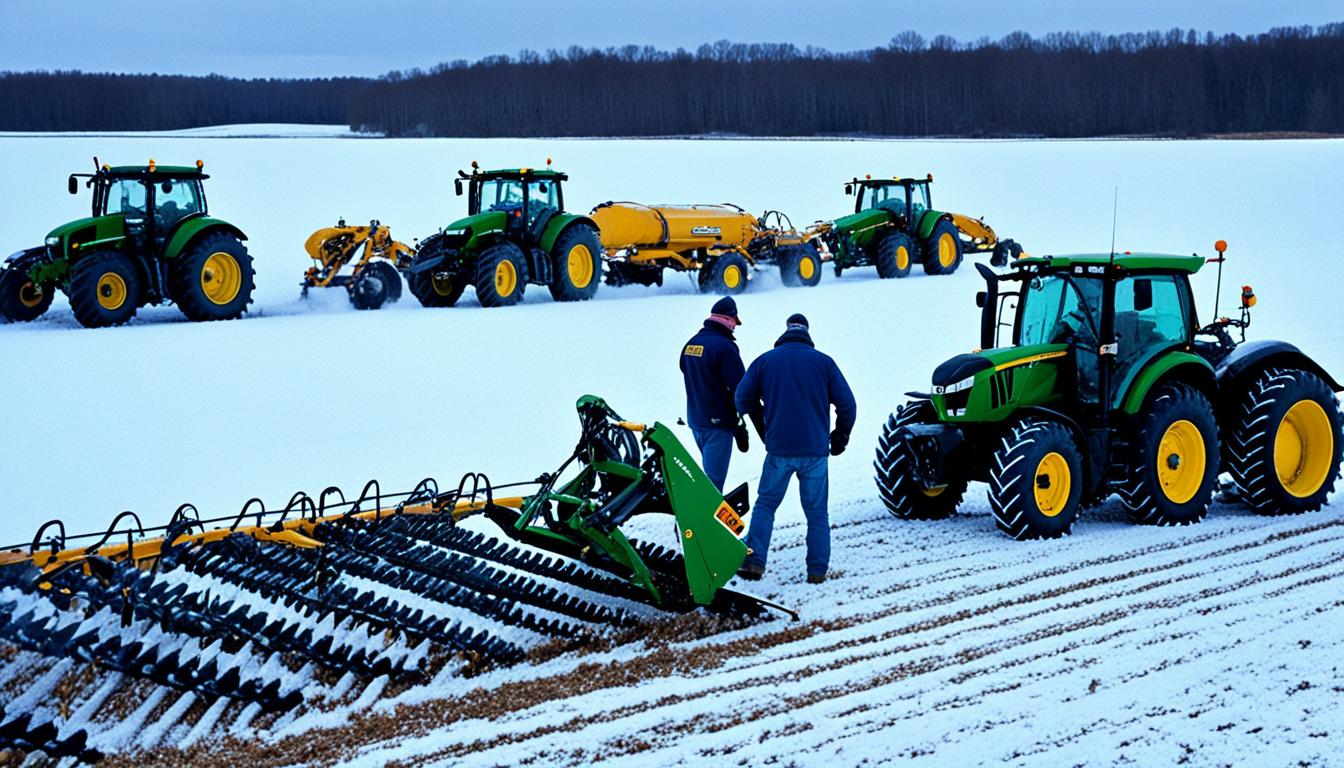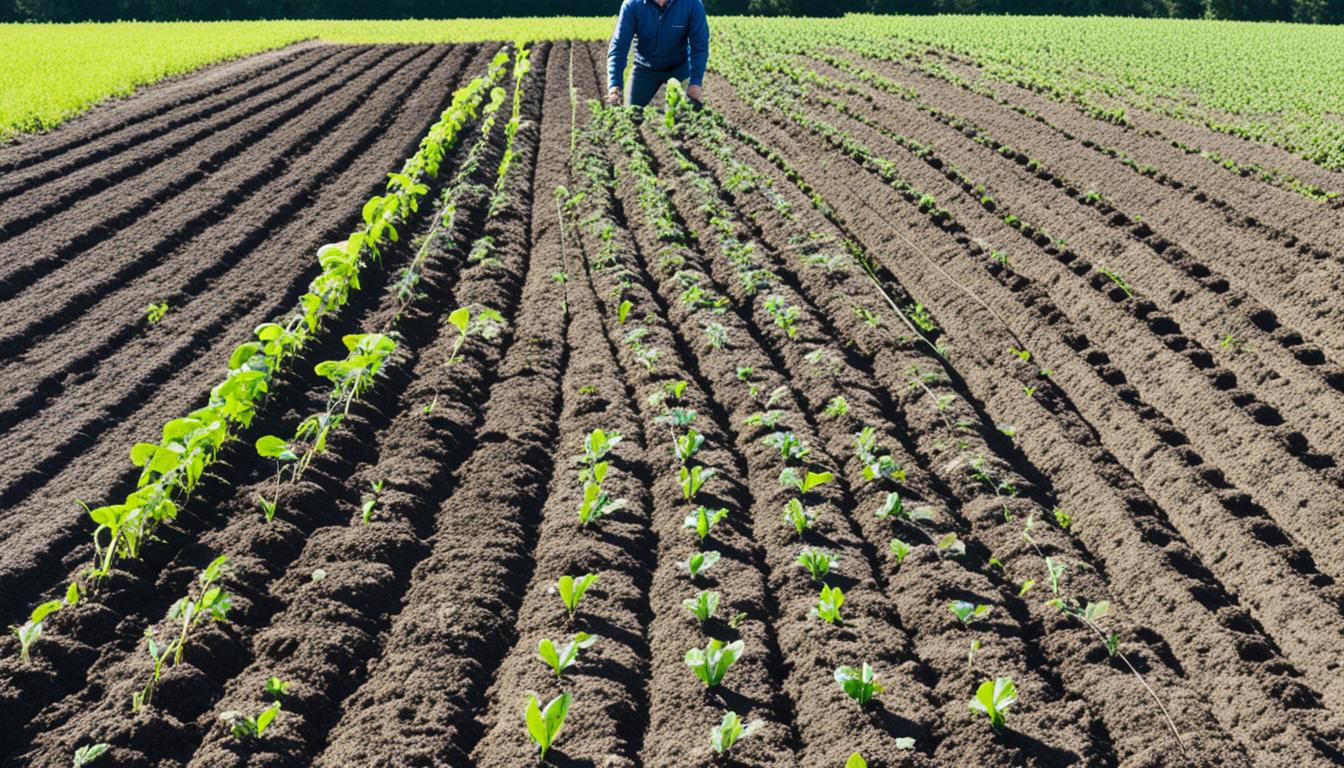Starting a career as a crop farmer is both rewarding and impactful. This guide will show you how to become a successful farmer. You’ll learn about education, skills, and the latest in farming.
If you’re new to agriculture or want to switch to crop farming, this article is for you. It will help you turn your passion for growing food into a career.
Crop farmers are crucial for feeding our communities and the world. You’ll learn about soil, irrigation, and new farming tech. This journey offers many chances to learn and make a difference.
Whether you prefer traditional or organic farming, or focus on a specific crop, this guide has you covered. Get ready to dive into agriculture and make a career out of your love for the land.
Introduction to Crop Farming
Crop farming is key to agriculture, providing food, fiber, and raw materials for our world. It’s essential for feeding our growing population. By focusing on sustainable methods, it also protects our environment.
The Importance of Crop Farming
Crop farming is crucial for many reasons:
- Food production: It’s the main source of the food we eat, ensuring everyone has enough to eat.
- Raw material supply: Many industries, like textiles and biofuels, need crops for their products.
- Environmental sustainability: Good farming practices keep soil fertile, save water, and fight climate change.
Understanding the Crop Farming Industry
The crop farming industry includes big and small farms. Farmers grow many crops, like grains and fruits, using different methods. New trends, like precision farming and urban farming, show the industry’s ability to change and meet new needs.
| Crop Type | Examples | Primary Uses |
|---|---|---|
| Grains | Wheat, corn, rice, barley | Food, animal feed, biofuels |
| Fruits and Vegetables | Apples, tomatoes, lettuce, carrots | Food, juices, canned products |
| Specialty Crops | Coffee, cotton, hemp, tobacco | Beverages, textiles, pharmaceuticals |
“Crop farming is not just about growing food, but about sustaining the delicate balance of our ecosystems and ensuring a brighter future for generations to come.”
How to Become a Crop Farmer
To become a successful crop farmer, you need education, experience, and a deep understanding of farming. If you’re just starting or changing careers, follow these steps to grow a successful farm. These steps will help you build a sustainable farm.
Pursue Relevant Education and Training
Getting a good education is key for crop farmers. Look into agricultural programs at colleges or universities. You’ll learn about agricultural education, farming methods, and how to become a crop farmer. Also, try to get hands-on experience through internships or apprenticeships.
- Earn a degree in Agricultural Sciences, Crop and Soil Sciences, or a related field
- Participate in internships or apprenticeships to gain hands-on farming experience
- Obtain relevant certifications, such as pesticide application or tractor operation
Develop Essential Farming Skills
Crop farmers need many skills, like knowing about soil and crops, and how to manage pests. It’s important to keep learning new skills and techniques as they come out.
- Develop expertise in soil fertility and nutrient management
- Learn efficient irrigation and water conservation techniques
- Familiarize yourself with conventional and organic farming methods
- Understand pest control and disease management strategies
Develop a Business Mindset
Being good at farming isn’t enough. You also need to know about business. This means understanding money management, risk, marketing, and how to get your products to customers. This knowledge is key for your farm’s success.
| Key Business Skills for Crop Farmers | Importance |
|---|---|
| Financial Management | Crucial for budgeting, investment, and profitability |
| Marketing and Sales | Essential for effectively reaching and serving customers |
| Supply Chain and Logistics | Vital for efficient distribution and product delivery |
By getting the right education, learning farming skills, and thinking like a business owner, you can succeed in farming. This approach will help you thrive in this rewarding field.
Agricultural Education and Training
To be a successful crop farmer, you need a strong base in agricultural sciences. Whether you’re starting or want to improve your knowledge, there are many programs and training options. These can help you excel in agricultural education and sustainable agriculture.
Degree Programs in Agricultural Sciences
Think about getting a degree in agricultural sciences for a career in crop farming. You’ll learn about farming methods, managing crops, soil science, and more. This knowledge is key to doing well in the field.
- Bachelor’s degrees in agricultural sciences, crop science, or agronomy are great for starting your career.
- Master’s programs in agricultural economics, plant sciences, or sustainable agriculture can boost your skills and open new doors.
- Doctoral programs in agricultural research or education prepare you for top roles like academia or policy-making.
Hands-on Training and Internships
Classroom learning is important, but practical training and internships are vital too. Look for chances to work on farms, join research projects, or intern at co-ops or extension services. These experiences are crucial for gaining the skills and knowledge you need.
“Education is the key to unlocking the potential of sustainable agriculture. By combining theoretical knowledge with practical experience, aspiring crop farmers can develop the skills and expertise needed to make a lasting impact on the industry.”
Choosing Your Crop Specialization
When looking at crop management, you have many options. From common grains and veggies to specialty and cash crops, there’s a lot to explore in sustainable agriculture. Knowing what each crop needs can help you pick the right one for you, your resources, and your local market.
Think about crop rotation too. It’s key for keeping your soil healthy and your farm sustainable. Rotating crops keeps the soil fertile and can stop pests and diseases. This means you might use fewer chemicals.
- Staple crops like wheat, corn, and rice are crucial for feeding people around the world. They give us the nutrients and calories we need.
- Vegetables such as tomatoes, leafy greens, and root veggies are popular for their health benefits and how versatile they are in cooking.
- Specialty crops, like heirloom varieties, organic produce, and unique herbs and spices, can open up special market chances and add variety to your farm.
- Cash crops, including cotton, tobacco, and some fruits, are grown mainly for their high market value and potential for export.
Think about the good and bad of each crop type to build a successful and sustainable farm. This way, you meet your community’s needs and reach your personal and professional goals.
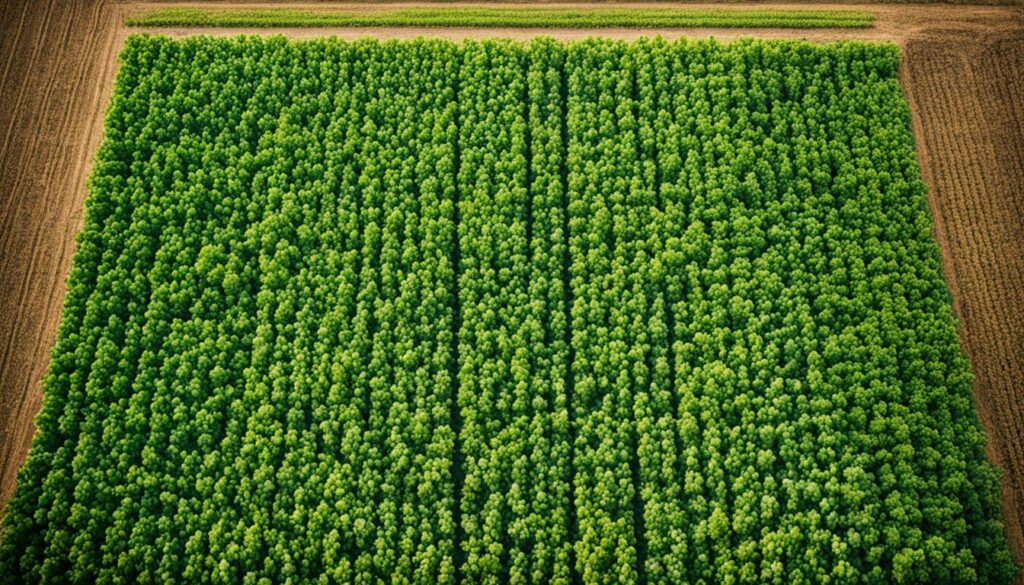
“The true meaning of life is to plant trees, under whose shade you do not expect to sit.”
– Nelson Henderson
Farm Management and Operations
Effective farm management and operational strategies are key to a successful crop farm. Mastering crop planning and rotation, as well as soil fertility and nutrient management, is crucial. This ensures your farm’s long-term success.
Crop Planning and Rotation
Crop planning and rotation are essential for better yields and soil health. They also help reduce pests and diseases. By choosing and arranging crops wisely, you improve soil fertility and control weeds. This boosts your crops and supports sustainable farming.
- Develop a detailed crop rotation plan with a mix of cover and cash crops.
- Rotate crops based on their nutrient needs, growth patterns, and disease risks. This makes your farm more balanced and resilient.
- Try intercropping and companion planting to increase your field’s diversity and productivity.
Soil Fertility and Nutrient Management
Healthy, nutrient-rich soil is the base of a thriving farm. Using sustainable soil fertility and nutrient management practices boosts your land’s long-term productivity. It also cuts down on synthetic fertilizers.
| Soil Fertility Technique | Benefits |
|---|---|
| Organic Matter Addition | Improves soil structure, water-holding capacity, and nutrient availability |
| Cover Cropping | Increases soil organic matter, controls weeds, and fixes atmospheric nitrogen |
| Precision Nutrient Management | Optimizes fertilizer use to meet crop needs and lessen environmental harm |
“Healthy soil is the foundation of a sustainable and profitable crop farming operation.”
Farming Methods and Techniques
Crop farming uses many different ways to produce food, each with its own benefits and challenges. From traditional farming to sustainable and organic methods, it’s key to know these approaches for those wanting to farm crops.
Conventional and Organic Farming
Traditional farming often uses synthetic fertilizers and pesticides to increase crop yields. This method can lead to more food but is being watched closely for its effects on the planet and people’s health. On the other hand, organic farming focuses on natural ways like crop rotation and cover cropping to keep soil healthy and cut down on chemicals.
- Conventional farming methods: Rely on synthetic inputs to boost yields
- Organic farming: Focus on natural, sustainable practices to support soil health and reduce chemical usage
Choosing between traditional and organic farming depends on the farmer’s goals, resources, and who they sell to. Organic farming might attract those who care about the environment and can pay more for their food. But, it can be harder to grow crops and control pests. Traditional farming can produce more food but must be done in a way that cares for the earth.
“The future of farming lies in the balance between productivity and sustainability. Embracing a blend of conventional and organic methods can help crop farmers meet the growing demand for food while minimizing their environmental impact.”
Farm Equipment and Technology
Successful crop farming needs the right equipment and advanced technologies. As a farmer, knowing the key farm tools and tech is crucial. This includes everything from planting to harvesting and processing after harvest. New tech like precision farming, remote sensing, and automation can make your farm better, more efficient, and sustainable.
Essential Farm Equipment
Having the right farm equipment is key to farming well. You’ll need:
- Tractors: These are the farm’s workhorses, used for many tasks like plowing and hauling.
- Plows and tillers: They prepare the soil for planting.
- Planters and seeders: These tools help put seeds in the ground correctly.
- Sprayers: They apply fertilizers, pesticides, and herbicides evenly.
- Harvesters and combines: These machines gather crops efficiently at harvest time.
- Post-harvest equipment: This includes silos, drying systems, and machines for processing.
Embracing Farm Technology
Modern tech can also improve your farming. Consider these advanced tools:
- Precision agriculture: Uses GPS and data to make farming better and use resources wisely.
- Autonomous and robotic equipment: Self-driving tractors and drones for tasks like spraying and checking on crops.
- Remote sensing: Uses satellites and drones to check on crop health and spot problems early.
- Predictive analytics: Uses weather data and learning to help make better decisions and manage risks.
Keeping up with new farm equipment and tech can make your farm more sustainable, efficient, and profitable.
Irrigation and Water Management
Managing water well is key to successful farming. It affects how much you get from your crops, their quality, and how green you are. Knowing how to manage water and use irrigation right is vital for your farm’s future and profits.
Efficient Irrigation Techniques
It’s important to look into different ways to water crops. This helps use water wisely and cuts down on waste. Some top ways to water crops include:
- Drip irrigation: This method sends water right to the roots, cutting down on evaporation and runoff.
- Sprinkler systems: Great for big farms, these systems can be set up to fit the needs of different crops.
- Surface irrigation: This old-school method works by watering the land directly, good for some soils and crops.
Knowing the good and bad of each method lets you pick the best for your farm. This makes your water use better and helps you farm in a green way.
| Irrigation Technique | Water Efficiency | Suitability for Different Crops | Installation and Maintenance Costs |
|---|---|---|---|
| Drip Irrigation | High | Versatile, suitable for a wide range of crops | Moderate to high |
| Sprinkler Systems | Moderate to high | Suitable for large-scale, row-crop operations | Moderate to high |
| Surface Irrigation | Low to moderate | Suitable for certain soil types and crops | Low to moderate |
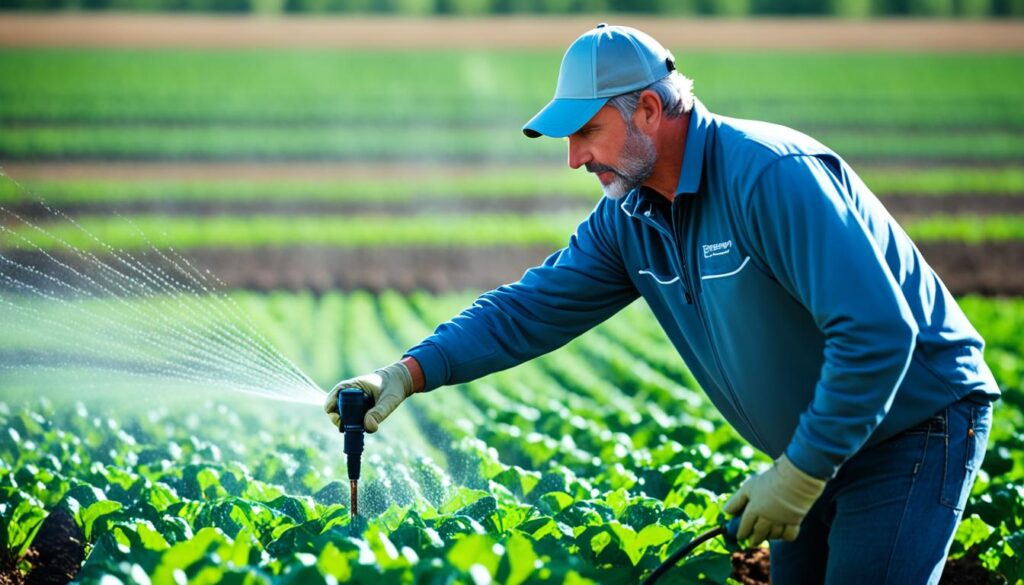
Using smart irrigation ways helps you use water better, waste less, and adjust to the weather. This makes your farm more sustainable over time.
Pest Control and Disease Management
As a crop farmer, it’s crucial to protect your plants from pests and diseases. This is key to keeping your crops healthy and your farming sustainable. By managing pests and diseases well, you can have a good harvest and protect the environment.
Knowing the pests and diseases that can harm your crops is the first step. You need to watch out for insects, rodents, fungi, and bacteria. These can hurt your crops and lower your profits if you don’t act.
Integrated Pest Management (IPM)
Integrated Pest Management (IPM) is a great way to fight pests. It’s a green approach that uses many methods to cut down on chemical pesticides. IPM uses crop rotation, planting certain crops together, and helpful insects to keep pests away naturally.
- Cultural practices: Proper crop rotation, keeping the area clean, and managing the habitat to keep pests away.
- Biological control: Letting natural predators and helpful insects control pests.
- Mechanical and physical controls: Using traps and barriers to keep pests away.
- Judicious use of pesticides: Using pesticides only when really needed and as a last choice.
Sustainable Pest Control Methods
There’s a push for sustainable pest control methods that are good for the environment and farmers. These methods include using natural pesticides, growing different crops, and keeping the ecosystem diverse. This helps keep pests in check without harming the planet or people.
| Conventional Pest Control | Sustainable Pest Control |
|---|---|
| Relies on synthetic pesticides | Uses natural, organic solutions |
| Can be bad for the environment and health | Has less environmental impact |
| May lead to pests becoming resistant | Takes a long-term, whole approach to managing pests |
Choosing a sustainable way to handle pests and diseases helps protect your crops, the environment, and your community. It also makes sure your farming can keep going for a long time.
Sustainable Agriculture Practices
Sustainable agriculture is more than a trend; it’s a key way to farm for a better future. For crop farmers, using eco-friendly farming is good for the planet and opens up new market chances. These practices appeal to consumers who care about the environment.
Environmentally Friendly Farming
Sustainable farming looks at the whole picture to lessen environmental harm. Key parts of this include:
- Reducing greenhouse gas emissions through efficient energy use and renewable energy sources
- Enhancing soil health by implementing practices such as cover cropping, reduced tillage, and organic matter management
- Preserving biodiversity by creating habitats for pollinators and other beneficial organisms
- Implementing integrated pest management techniques to reduce reliance on synthetic pesticides
- Practicing water conservation through efficient irrigation systems and rainwater harvesting
By using these sustainable methods, farmers can lessen their environmental impact. This also makes their farms more productive and resilient over time. This leads to more chances in the market as people pay more attention to where their food comes from.
| Sustainable Agriculture Practice | Environmental Benefits | Economic Opportunities |
|---|---|---|
| Organic farming | Reduced synthetic chemical use, improved soil health, increased biodiversity | Growing demand for organic produce, premium pricing |
| Precision agriculture | Efficient resource use, reduced waste, decreased greenhouse gas emissions | Cost savings, improved yields, access to precision farming technology incentives |
| Agroforestry | Carbon sequestration, habitat creation, reduced soil erosion | Diversified income streams, access to carbon credit programs |
Adding sustainable farming to your crop business helps the environment and sets you up for success. The agricultural world is always changing, and being eco-friendly can give you an edge.
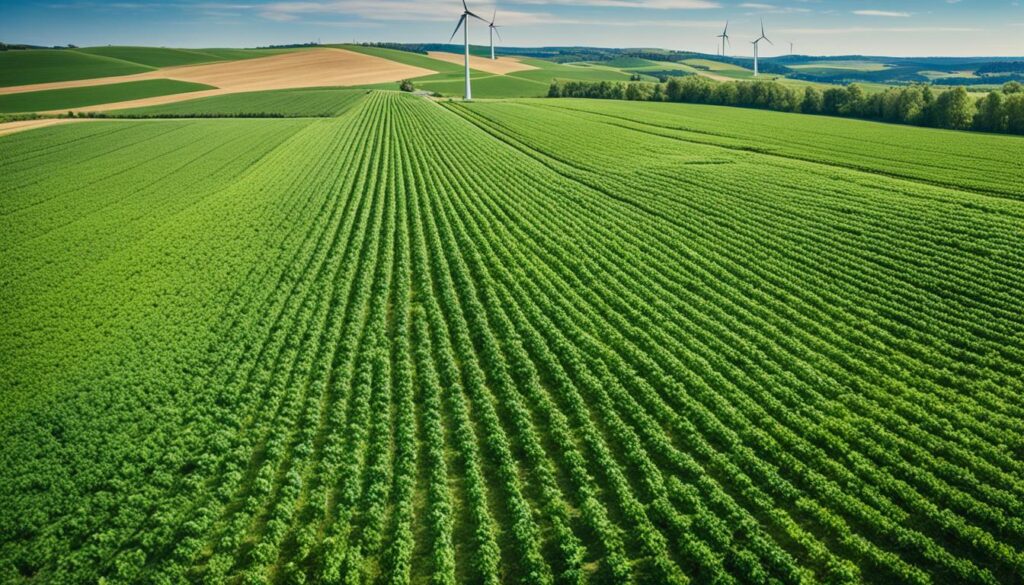
“Sustainable agriculture is not just good for the planet – it’s good for business. By embracing eco-friendly farming practices, crop farmers can enhance their profitability and meet the growing demand for environmentally responsible food products.”
Marketing and Distribution Strategies
Successful crop farming is more than just growing crops. It also means you need to market and distribute them well. As a farmer, you’ll look at different ways to sell your crops. This includes selling directly to customers, to wholesalers, or online. A good marketing plan helps you reach your customers and make your farm profitable.
Direct-to-Consumer Sales
Selling crops directly to consumers is a great way to market them. You can do this by having a farm stand, selling at farmers’ markets, or offering a CSA program. This approach helps you build a loyal customer base and might let you charge more for your crops.
Wholesale Markets
You can also sell to wholesalers, like local grocery stores or restaurants. This can give you a steady income, but you’ll need to agree on prices and meet certain quality standards.
E-commerce and Online Sales
E-commerce has opened new doors for farmers. You can sell your crops online through your own site or on platforms like Etsy or Farmer’s Web. This can help you reach more people, but you’ll need to work on your brand, prices, and how you ship products.
| Sales Channel | Advantages | Challenges |
|---|---|---|
| Direct-to-Consumer |
|
|
| Wholesale Markets |
|
|
| E-commerce and Online Sales |
|
|
Choosing the right sales channels is key to your farm’s success. Understanding your market, building a strong brand, and managing logistics well are essential. This way, you can sell your crops effectively and make the most profit.
Challenges and Opportunities in Crop Farming
Crop farming has its ups and downs, like any industry. As a farmer, you’ll face tough weather, changing markets, and new rules. But, you can also grab the chances that new trends and innovations bring to this field.
Weather is a big challenge in crop management. Droughts, floods, and extreme heat can hurt your crops and your profits. It’s key to make your farming ways more flexible to handle these changes.
Market ups and downs are another hurdle for farmers. Prices for crops can swing a lot, making it hard to budget and keep your farm running well. Keeping up with market trends and growing different crops can help you manage these risks.
But, the farming world is changing, offering big chances for creative farmers. New tech like GPS tractors and drones is changing how we manage crops. Using these tools can make you more efficient and competitive.
There’s also a big push for organic and local food, which is great for sustainable agriculture. By using green farming ways, you can reach customers who care about the planet.
To do well in crop farming, you need to be flexible, smart, and open to new ideas. Keep learning, use new tech, and focus on being sustainable. This way, you can make your farm successful for the long run.
“Successful crop farming is not just about growing plants, but about constantly adapting to the ever-changing environmental and market conditions.” – Jane Doe, Sustainable Agriculture Consultant
Conclusion
Becoming a successful crop farmer takes more than just one thing. It’s about combining education, practical skills, and understanding the industry. This guide has shown you the steps to start a fulfilling career in crop farming.
If you’re into sustainable farming, new techniques, or helping your community, this article has given you the key info and resources. You now know how to get into agricultural education, pick your favorite crop, and manage a farm. You’re ready to tackle the changing world of crop farming.
Starting your journey to be a crop farmer means facing both challenges and chances. Keep learning, adapt to new changes, and use the latest in how to become a crop farmer, agricultural education, and farming methods. You’re set to make a big impact in this field. The future of sustainable farming is yours to shape. Go out there and leave your mark in crop farming.
